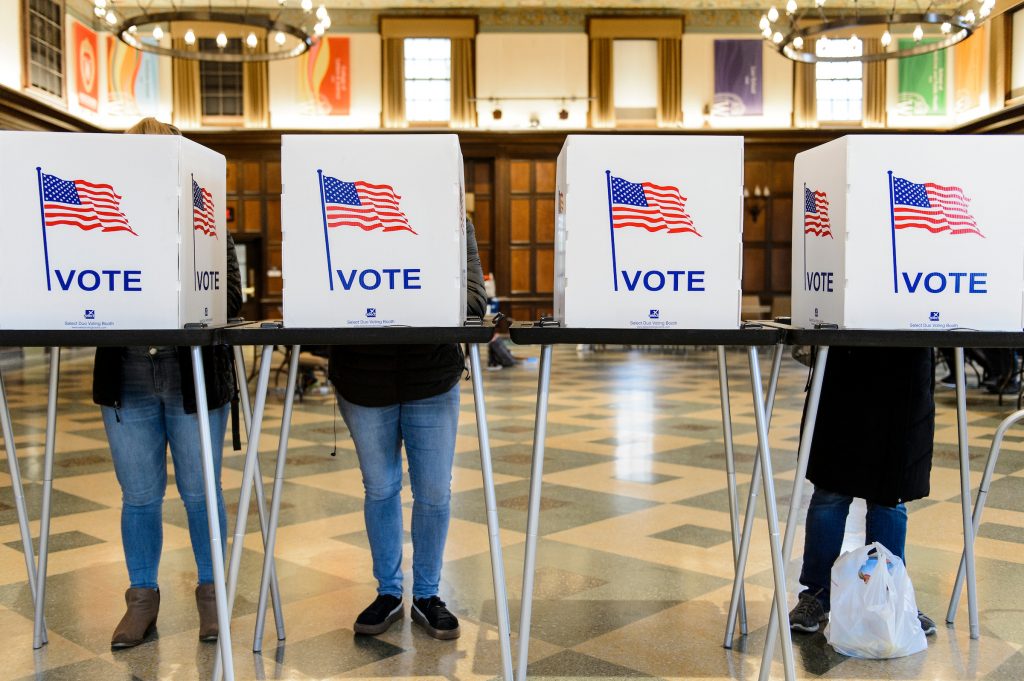
On April 3, 2018, students fill out ballots for the Wisconsin Spring Election in Tripp Commons inside the Memorial Union at the University of Wisconsin-Madison, one of several official polling places for UW-Madison students living on campus. (Photo by Bryce Richter / UW-Madison)
The 2020 presidential primary will not officially begin for another ten months. And yet campaigning, and media coverage about that campaigning, are already well underway. A large field of Democratic candidates and a long election cycle present a challenge for journalists and news organizations.
The ethics question at the heart of election coverage is this: what approaches best serve the public interest? In the past, media outlets have tended to use what some call horse race coverage, an approach that focuses on the competition between candidates. Rather than exploring candidates’ proposed policies or substantive issues, horse race coverage tries to gauge who’s winning and who’s losing. In horse race coverage, fundraising and endorsements are tallied to see who’s ahead, polls are hyper-analyzed and overplayed, differences between candidates are inflated and electability is scrutinized.
This kind of election coverage is also increasingly coming under scrutiny. According to its critics, horse race coverage trivializes elections and fails to adequately inform voters. Margaret Sullivan, media columnist for The Washington Post, wrote in a February column that the early horse race coverage for 2020 had started to make Bernie Sanders, Joe Biden and Beto O’Rourke seem “inevitable” and “invincible,” a trend she said could be potentially dangerous. At its worst, horse race coverage can take media outlets from informers, who serve the needs of voters, to influencers, whose coverage affects the result of elections.
To help navigate election coverage, we have collected resources on alternatives to horse race coverage, as well as additional resources for ethically covering elections.
Alternatives to Horse Race Coverage
- “I’d prefer that it not be covered as a game, that the seriousness of it comes through,” Barry Burden, director of the Elections Research Center, said. While things like endorsements and fundraising matter, Burden said it is important to do more than just keep a tally of those numbers. Rather than totaling up the sum of fundraising, he suggested writing stories on the nature of the fundraising and where donations are coming from.
- Media critic and professor of journalism Jay Rosen wrote a Twitter thread about the “citizen’s agenda,” an approach to election coverage created by The Charlotte Observer. This approach seeks to answer the question “What do you want the candidates to be discussing as they compete for votes?”
- In an article written for Nieman, Jim Morrill examines the relevance of the “citizen’s agenda” in 2020 and discusses whether it should be used in the upcoming election. His answer? Yes and no.
- Storybench, a digital storytelling project out of Northeastern University, is creating a tracker for media coverage showing which outlets are using horse race coverage and will provide analysis on what news media are covering.
Additional Resources
- Poynter provided this brief list of approaches that were used in the 2018 midterm that could be useful in the 2020 election.
- The Columbia Journalism Review offers eight tips for covering the upcoming election.
- The New York Times debuted a live tracker that can help navigate the crowded field. It puts people into five categories: running, likely to run, might run, unlikely to run and not running. The tracker also provides a brief background for each potential candidate and signature issues for those who are running or are likely to run.
Some Quick Tips
- Write about the candidates themselves. According to Burden, most of the candidates are not well known right now. “Part of what reporters can do is just help voters get to know who these people are,” he said.
- Avoid entertainment fodder. “Who Cory Booker is dating is an entertainment item, it’s probably not going to affect how he governs,” Burden said.
- Pay attention to the rules. An open primary in New Hampshire, new “remote caucus” rules in Iowa and early voting in California could all play a role in the Democratic primary, according to Burden.
- Don’t overplay opinion polls. “National polling right now is not indicative of much,” Burden said. According to him, polls will have more value as election day draws closer and the polls become more state-specific.
- Learn from mistakes made in polling and interpreting polling results in the 2016 presidential election. The American Association for Public Opinion Research has a must-read evaluation of 2016 polling.
